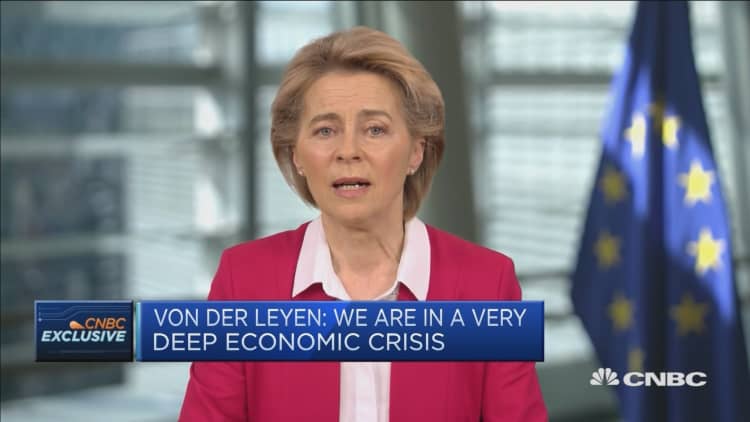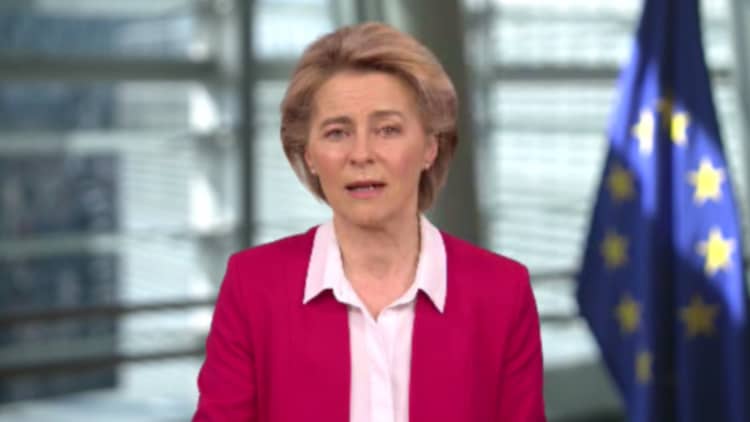
Market players want to know how much the European Union will provide in additional coronavirus stimulus, but the institution in charge of developing it says it's still under negotiation.
The GDP of the European Union — a group of 27 countries — contracted by a record 3.5% in the first quarter of the year, and the region is facing an unprecedent economic crisis on the back of the ongoing pandemic. The European Commission, the executive arm of the EU, was last month tasked with developing a financial mechanism that will help countries deal with the fallout.
However, speaking with CNBC Thursday, European Commission President Ursula von der Leyen said they are still working on the details of the fund.
"We are just in the starting point to set the program and to negotiate the details," von der Leyen told CNBC's Geoff Cutmore in an exclusive interview.
European leaders decided last week to step up their contributions into the next European budget, so the nations hit hardest by the crisis can count on some additional financial support. However, during their video call, the heads of state did not agree on how big that financial support should be nor whether it should be made up of loans or grants.

Countries in the south are supportive of grants, given that this would not increase their already-massive debt piles. On the other hand, northern nations prefer loans, even if they have favorable repayment conditions.
The European Commission is talking with the 27 capitals to overcome this impasse. The aim is to make a proposal in the first half of May.
This financial mechanism is often referred to as Recovery Fund. The Commission's economic affairs chief has suggested it should reach as much as 1.5 trillion euros ($1.65 trillion).
Will it work this time?
However, analysts have their doubts that the Commission's plan will achieve "a lot," given that it's hoped that a large component will come from private sources.
"Triggering private investment depends on whether private investors want to invest, and this is an uncertain time," Zsolt Darvas, senior fellow at the Brussels-based think tank Bruegel, told CNBC Wednesday.
He added that the Recovery Fund could be similar to what the Commission announced in late 2014 — an investment plan, which leveraged private investment to support projects across the bloc that would have struggled to get financing otherwise.
What is at stake is not just Covid-19 … but also the future of the EU.Gaetano GaballoAssociate professor at H.E.C. Business School
However, the think tank has found that most of the projects that received financing under the 2014 program would not have struggled to get financial backing.
"There could be more riskier projects now," Darvas said, but he doubts that the EU will increase risk.
Speaking to CNBC Thursday, Gaetano Gaballo, associate professor at H.E.C. Business School in Paris, said the "composition is the most important" aspect. "The size (of the Recovery Fund) can be expanded" in the future, he said.
"What is at stake is not just Covid-19 … but also the future of the EU," Gaballo said over the phone.
The debate over loans versus grants is particularly toxic among member states. Southern countries argue that a heavy loan component will add too much pressure on their finances at a time when the crisis is global and not the fault of one specific country.

Daniel Gros, a German economist, also said that the design of the Recovery Fund will have political ramifications.
"This fund will be ambitious, probably promising to solve all problems. But I doubt it will achieve a lot. However, its existence and headline size will be politically important," he said via email.
More European citizens could rally behind anti-EU parties, which could ultimately jeopardize the European Union as a project.
The EU's Recovery Fund is in addition to a half-a-trillion euro stimulus program organized among euro zone nations and on top of the European Central Bank's monetary stimulus.


